"Reminds me of a time up in Navasota, Texas, eatin' barbeque an' drinking red soda water on the 19th of June ..."
I loved the syncopation. But what did it mean? I had no idea, but used to (still do) sing it over and over, like a mantra! Then one day, I discovered what every Texan knows, and what Joe is talking about. Tomorrow is Juneteenth!
For those outside the USA, I'll give some background to this celebration. On January 1st 1863, as part of his efforts to bolster a war effort that seemed to be in danger of stagnating or even turning against the Union, President Abraham Lincoln published the Emancipation Proclamation. The moment had not been ideal, but with the Confederate advances at least halted at the Battle of Antietam, he was unlikely to have a more propitious moment. Not fully converted himself to the concept of black equality, Lincoln was nonetheless now convinced of the important military role that black Americans could play, and Emancipation of slaves in territories taken back from the Confederacy was the means to harness that new source of fighting men for the Union cause. Perhaps he would allow black soldiers the right to vote after the war, he mused...
The Proclamation itself did not free a single person that day - it only applied to slaves in territory captured in the future, so not to people in places like Tennessee that had already been recaptured, or to the slave-owning Border states that had remained politically loyal to the Union. Nor was it the first opportunity for slaves to take freedom in the war: slaves had been crossing the lines on their own initiative since early on, and at Fortress Monroe, Virginia, overwhelmed by the numbers of black men and women making their way to his command, General Benjamin Butler gave it his sanction by dubbing the free men and woman 'contraband of war' and refusing to hand them back to their former masters. In fact, he had received some considerable pressure from Lincoln himself to abandon this unauthorised policy...
But over the next two years the Proclamation began to have its effect as Grant and Sherman's armies made their progress through the South. Rumours concerning the Emancipation Proclamation began to circulate amongst southern slaves, and more were encouraged to take their freedom. Many made their way to the North to enlist as Union soldiers.
One part of the Confederacy lingered on for a few months after all the rest had capitulated - Texas. On 19th June 1865, General Gordon Granger read out General Order No.3, which announced the Emancipation Proclamation in Galveston. At that time, approximately 250,000 slaves resided in the state. From this date, they were slaves no more. Yet, still, slavery would persist in Kentucky and the other Border States until the passage of the 13th Amendment.
Celebration amongst black Texans went on for days. However, would the Union guarantee them civil or political rights? Would they be able to play an active role in the Reconstruction of their state? In the first few years after 1865, there were positive signs, black office-holding was achieved; black sheriffs, black mayor in Donaldsonville, Louisiana, black members of state legislature, black congressmen Joseph Rainey, and black senator Hiram Rhodes Revels.
But by 1883, only John Lynch remained as an elected member of Congress. Gradually, after 1876, new alliances of southern whites began to form, and in the 1890s, not even the black-white solidarity that had helped buttress the Farmers' Union and Populist movement could prevent to imposition of new 'jim crow' laws and segregation espoused by new Democrat demagogues who fused issues of the southern white poor with racialism.
Yet throughout these years, celebrations of June 19th continued, dubbed Emancipation Day in those times, particularly in Texas, Louisiana, and the black-belt districts of Oklahoma and Arkansas. Black leaders in Houston purchased land for an Emancipation Park in 1872, and a similar thing happened in Austin in 1906. It was even condoned by the segregationist administrations, in certain places allowing black Americans entry to white-only leisure facilities for the day. There is some debate as to whether the form and conventions of 'Juneteenth', as it became know in the 1920s, was being manipulated to depoliticise it.
Despite, or because of this, the celebration survived, and after the changes of the civil rights movement in the 1950s and 1960s, it began to gain greater recognition. Texas made Juneteenth an official holiday in 1980, and the President blesses the event as a 'special day'. This year, events are being held in at least a dozen countries. It has developed into a celebration of the meaning of freedom, and a day of remembrance for those who had it taken from them. It is as important today to think of those things as back in 1865.
Ok, enough history lessons for today - get some friends and family together, make yourselves comfortable, cherish each other, tell stories and sing songs, open up some strawberry soda and share some good food. Who better to get us in a party mood than Joe? Meanwhile, the Zion Harmonizers do a wonderful rendition of the song which has become the anthem of this day.
Joe Tex - Men Are Gettin' Scarce (Dial 45-4063) 1968
The Zion Harmonizers - Lift Every Voice And Sing (Mardi Gras Records) 1993
Find out about how Lift Every Voice And Sing was written by listening to this NPR report by Dave Person. You can find out more about the song at NPR: At The Creation.
More information about Juneteenth can be found at the official Juneteenth website, along with ideas for celebrating and information about events across the USA and other countries. www.AfriGeneas.com also has in-depth information about Juneteenth and other African-American heritage.
The inspiring Professor Ira Berlin has organised a Juneteenth photo article at the Oxford University African-American Studies Centre website.
Find more versions of Lift Every Voice And Sing listed at http://creativefolk.com/blackhistory/lift.html. The Women of The Calabash do a great version.
Further historical details in this article provided from the seminars of Prof. Eric Foner, and by Dr Adam Smith of University College London. Also, the ghost of Mary Lincoln has visited me in a spiritual vision (well, the comments section, anyway) to remind me that I had written Declaration instead of Proclamation all through this post!...
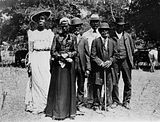
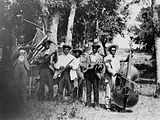
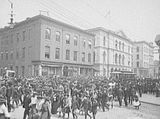
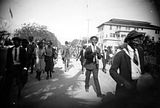
Contemporary celebrations of Juneteenth
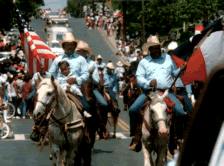
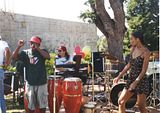
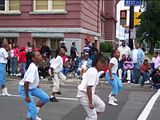

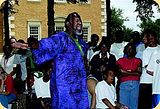


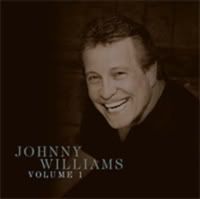



2 comments:
Hi brown-eyed handsome man. Great history lesson. An historiographically-aware reading of Lincoln. But its the emancipation PROCLAMATION not the emancipation declaration. And to be pedantic Gen Butler coined the term contraband when he was in command at Fortress Monroe not when he was in command of Union occupied New Orleans. An interesting and telling footnote to the story is that the numbers of black office holders in the South did not reach Reconstruction levels again until 1980. Keep up the good work Brown Eye!
Oops! It's so ong since I studied this, I was writing off the top of my head. Can I say it was a typo?
Let this be a lesson to all students: always check your sources!
Thanks Mrs Lincoln... hey, wait a minute, you're...
Post a Comment